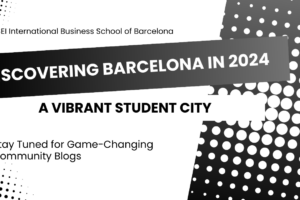
Cost of Living in Barcelona: A Guide for University Students
- Categories Barcelona, ESEI Community

Barcelona is a bustling city in Spain that attracts thousands of students from around the world every year. The city is famous for its architecture, beaches, and lively nightlife. However, with its popularity comes a high cost of living. In this article, we will delve deeper into the cost of living for university students in Barcelona and provide some useful tips for managing expenses.
Accommodation
One of the most significant expenses for university students in Barcelona is accommodation. On-campus housing is an option, but it can be costly and limited in availability. Alternatively, students can rent an apartment or share a flat with other students. The cost of renting a room in a shared apartment in Barcelona can range from €400 to €800 per month, depending on the location and size. Sharing a flat with other students can reduce the cost of rent and bills by half. It’s essential to start looking for accommodation early to avoid the high demand and prices.
Food
Food is another significant expense for university students in Barcelona. Eating out can be expensive, so it is advisable to cook meals at home. The cost of groceries in Barcelona is similar to other European cities. A weekly grocery budget of €50 to €70 can provide sufficient food for one person. Students can save money by buying groceries from local markets and supermarkets instead of specialty stores. Moreover, students can check out the supermarkets’ sales and promotions to get better deals.
Transportation
Barcelona has an excellent public transportation system, including the metro, bus, and tram. A monthly pass for unlimited travel on public transport costs €20. A bicycle is also a popular mode of transport in Barcelona. A Bicing subscription is for €50 per year, or students can purchase a used bicycle for around €100. Owning a car in the city is not recommended due to the high cost of parking and fuel. Students can opt for walking, cycling, or public transport to save money on transportation.
Entertainment
Barcelona is renowned for its vibrant nightlife, but it can be costly. Club entry fees range from €5 to €20, and drinks cost around €8 each. Students can save money by taking advantage of happy hour deals and pre-drinking before going out. There are also many free or low-cost activities in Barcelona, such as visiting museums, parks, and beaches. Additionally, students can join free events and activities organized by their university.
Utilities
Utilities such as electricity, gas, water, and internet are additional expenses for university students in Barcelona. The cost of utilities varies depending on the size of the apartment and its usage. The average cost of utilities for a one-bedroom apartment is around €100 per month. It’s important to be mindful of energy usage to reduce monthly utility bills.
Healthcare
Barcelona has a comprehensive healthcare system, and students can access healthcare services with their European Health Insurance Card (EHIC). However, private healthcare can be expensive, so it is advisable to have comprehensive health insurance. Health insurance for students can cost around €600 per year. Some universities offer health insurance plans for their students, and it’s essential to check with them before purchasing any insurance.
Tips for Managing Expenses
Here are some additional tips for university students in Barcelona to manage their expenses:
- Look for scholarships and grants – Students can apply for scholarships and grants to cover some of their academic and living expenses.
- Opt for a part-time job – Students can work part-time to earn extra income and cover their expenses. Many companies in Barcelona hire students for various jobs, including tutoring, language teaching, and administrative work.
- Use student discounts – Many shops, restaurants, and entertainment venues offer student discounts. It’s essential to carry a student ID card to avail of these discounts.
Moreover, students can also consider taking up part-time jobs to supplement their income. There are many opportunities for students to work in Barcelona, such as in bars, restaurants, cafes, and shops. Working part-time can also provide students with valuable work experience, which can enhance their CVs and increase their employability after graduation. However, students should be aware of their visa requirements and the maximum number of hours they are allowed to work per week.
To sum it up, the cost of living for university students in Barcelona can be expensive, but with careful planning and smart budgeting, it is possible to manage expenses and enjoy all that the city has to offer. By taking advantage of affordable accommodation options, cooking meals at home, using public transport, and seeking out free or low-cost activities, students can save money while still having a great time in this beautiful city. It is essential to remember that studying abroad is a unique and enriching experience that can have long-lasting benefits. Therefore, by managing their finances wisely, students can make the most of their time in Barcelona and create memories that will last a lifetime.
Explore Barcelona with ESEI International Business School of Barcelona
You may also like



